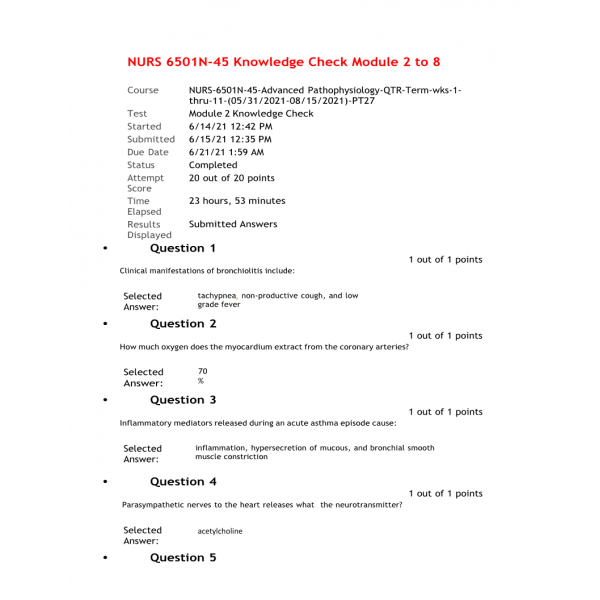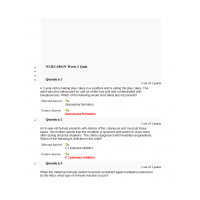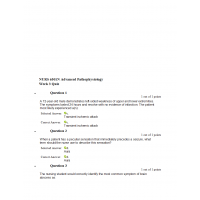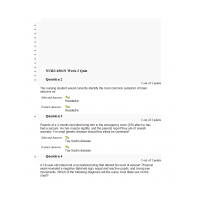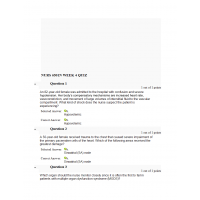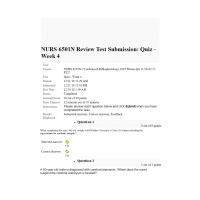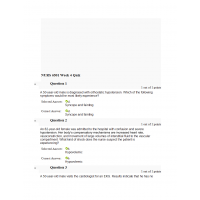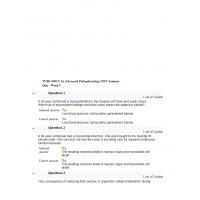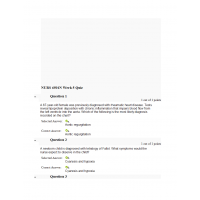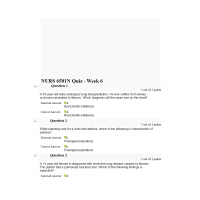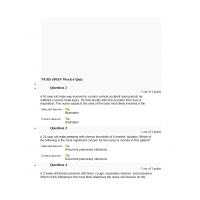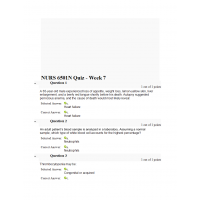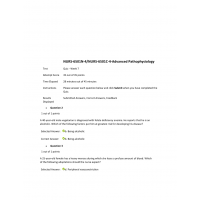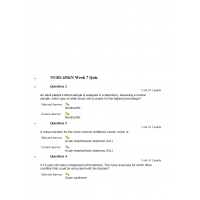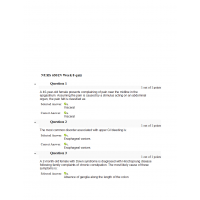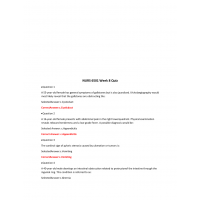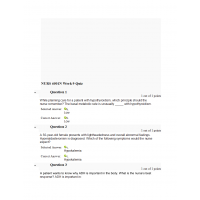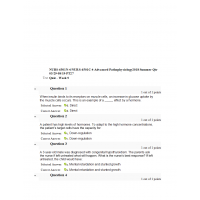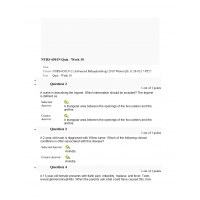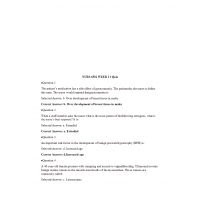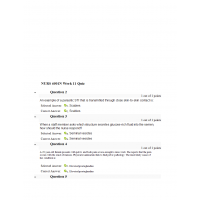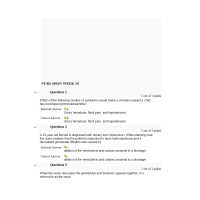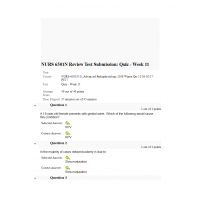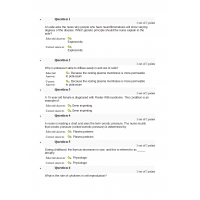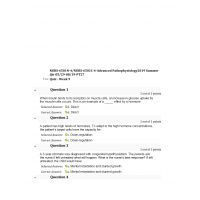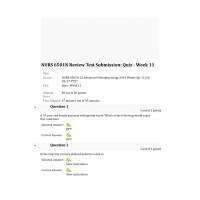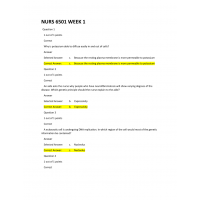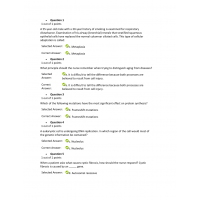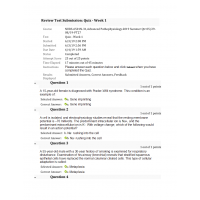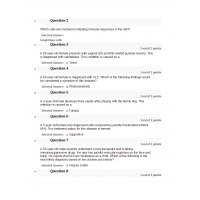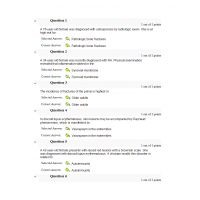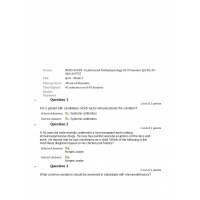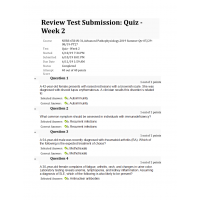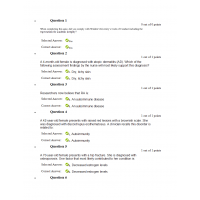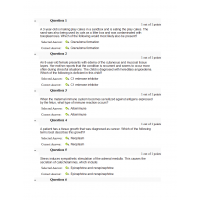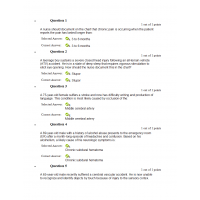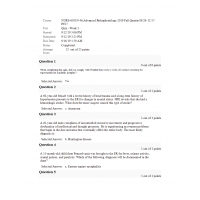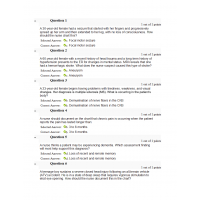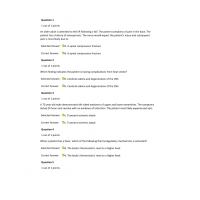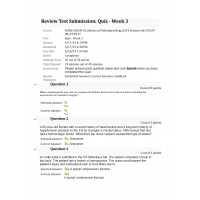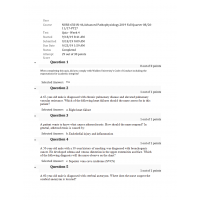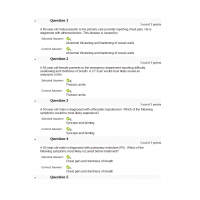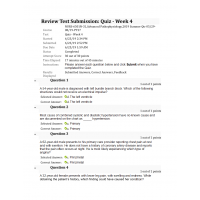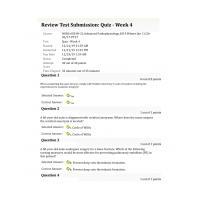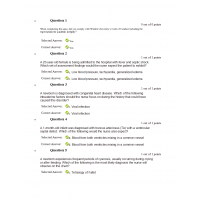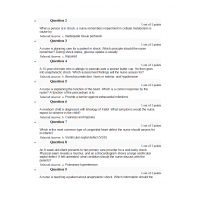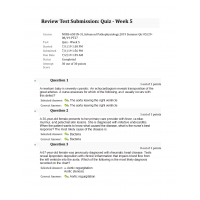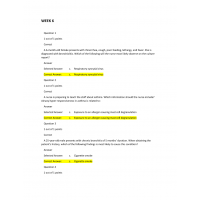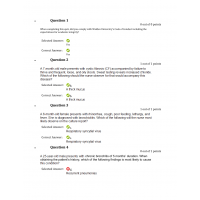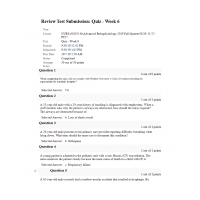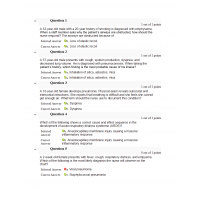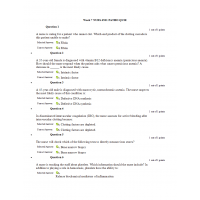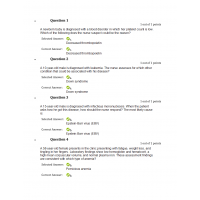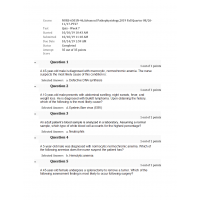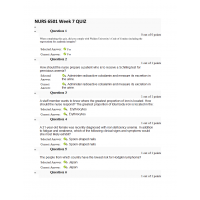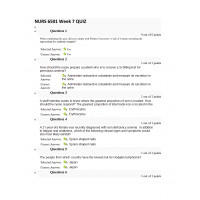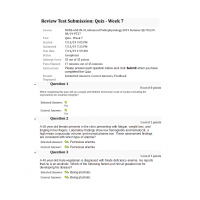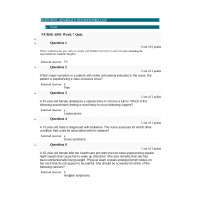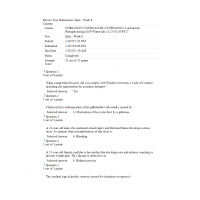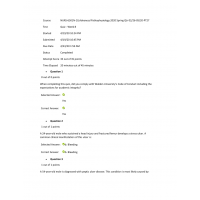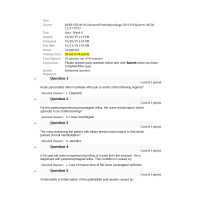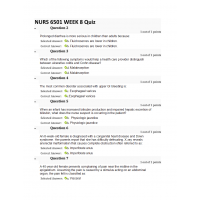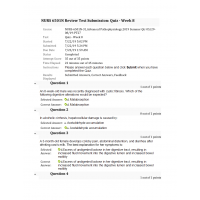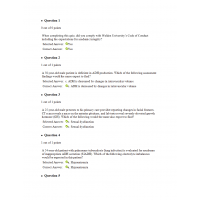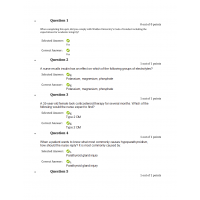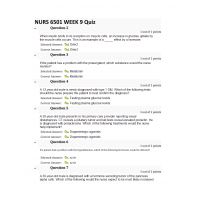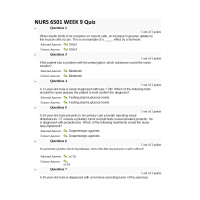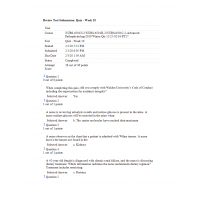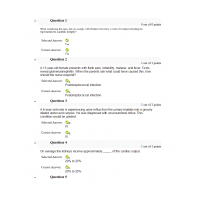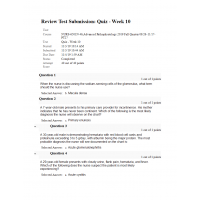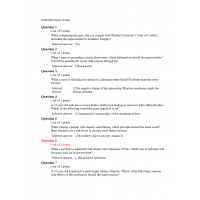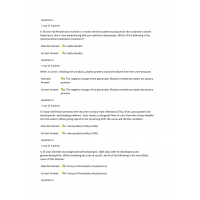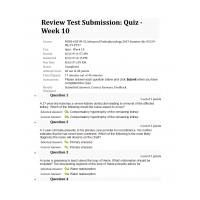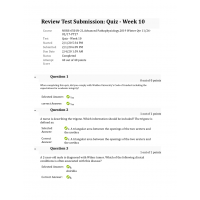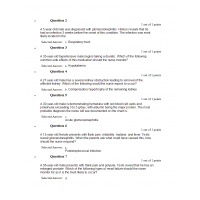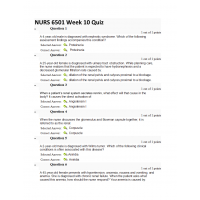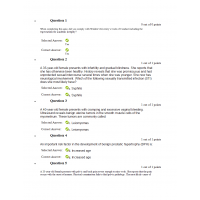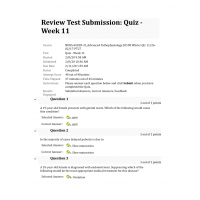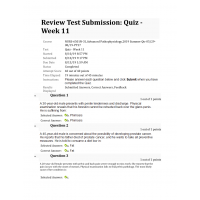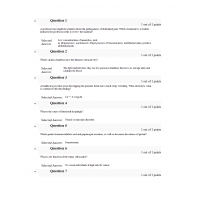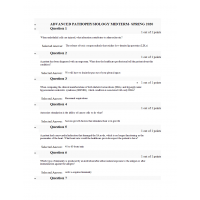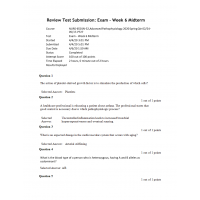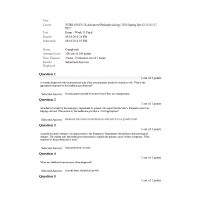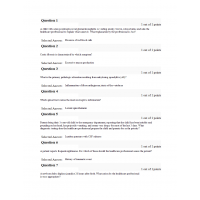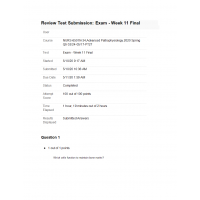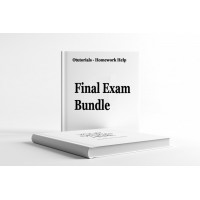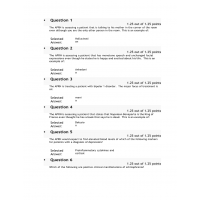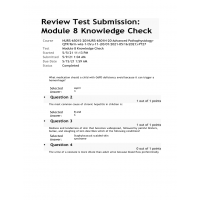NURS 6501N Module 2 to 8 Knowledge Check
NURS-6501N-45-Advanced Pathophysiology-QTR-Term-wks-1- thru-11
Module 2 Knowledge Check
1. Clinical manifestations of bronchiolitis include:
2. How much oxygen does the myocardium extract from the coronary arteries?
3. Inflammatory mediators released during an acute asthma episode cause:
4. Parasympathetic nerves to the heart releases what the neurotransmitter?
5. As a person ages, what type of changes occur in the myocardium and arterial walls?
6. Norepinephrine action on a1-adrenergic receptors causes .
7. Sympathetic nerves to the heart releases what the neurotransmitter?
8. Inflammation of the membranous sac that surrounds the heart is a description of which condition?
9. Acute rheumatic fever is a complication of a:
10. A person who has pulmonary edema will exhibit which symptoms?
11. A patient that is hyperventilating will have a decreased:
12. Binding of ATP to myosin that enables myocardial contraction requires which electrolyte?
13. The right side of the heart is a high-pressure system
14. Passage of fluid and/or solid particles into the lungs is a(n):
15. The V/Q ratio of a normal upright lunch is 0.8, this indicates that ventilation is than perfusion.
16. Stimulation of the carina often causes:
17. The most effective way to measure the adequacy of alveolar ventilation is to measure:
18. Collapse of alveoli is a(n):
19. Ischemic pain in the lower extremities that occurs while walking but disappears when resting is a description of which condition?
20. The presence of pus in the pleural cavity is a(n):
NURS-6501N-45-Advanced Pathophysiology-2021-Summer- QTR-Term-wks-1-thru-11
Module 3 Knowledge Check
1. Cells that remove bacteria and foreign particles from blood in the hepatic sinusoids are called?
2. What hormone delay gastric emptying?
3. Bilateral renal calculi can cause what type of acute kidney injury?
4. A man with a cauda equina involvement in multiple sclerosis became incontinent when his caregiver was late and was not available to assist with the morning catheterization is experiencing what type of incontinence?
5. Severe right-sided heart failure can cause:
6. A patient with massive proteinuria, hypoproteinemia, hyperlipidemia, and edema is experiencing classic symptoms of:
7. A patient with sudden onset of oliguria with elevated plasma BUN and plasma creatinine levels is experiencing classic symptoms of:
8. A gastric enzyme that digests proteins is called
9. Hypoxia causes the kidney to secrete what hormone?
10. Filtration occurs in what portion of the kidney?
11. Cells that secrete hydrochloric acid and intrinsic factor are called?
12. The functional glomeruli are located in what part of the kidney?
13. The decreased renal excretion of sodium and water is caused by what substance?
14. A pancreatic enzyme that digests carbohydrates is called
15. Bile acid are recycled by the body and absorbed via:
16. A patient with severe colicky flank pain radiating to the groin, nausea and vomiting, and some hematuria is experiencing classic symptoms of:
17. Acute mesenteric ischemia damages the intestinal mucosa and can eventually cause:
18. The increased renal excretion of sodium and water is caused by what substance?
19. What hormone stimulate gastric emptying?
20. A salivary enzyme that digests carbohydrates is called
NURS-6501N-45-Advanced Pathophysiology-2021-Summer- QTR-Term-wks-1-thru-11
Module 4 Knowledge Check
1. In autoimmune-mediated diabetes pancreatic beta cells are destroyed by autoreactive
2. cytotoxic T lymphocytes B lymphocytes monocytes
3. Cushing disease, primary hyperthryoidism and secondary hypothyroidism
4. In order for a hormone to act on a cell, the cell must have for that hormone
6. Nonpitting boggy edema caused by infiltration of mucopolysaccharides and proteins between connective tissue in the dermis describes what condition?
7. What is the difference between brown and white adipocytes?
8. Calcitonin regulates the plasma concentration of what electrolyte?
9. Cytokines and hormones secreted by adipose tissue are known as
10. Low blood sugar during the night that may lead to morning-rebound hyperglycemia describes what effect?
11. What effect does high levels of leptin have?
12. Hypertension, hypokalemia, increased blood pH, increased urine potassium are symptoms of what condition?
13. Type of adipose tissue, located viscerally and subcutaneously, with adipocytes that have one lipid droplet are called as:
14. A chemical signal generated within a cell that mediates the action of a water- soluble hormone or other chemical is known as:
15. Extracellular fluid volume and plasma potassium concentration is regulated by what hormone?
16. What effect does incretins have on postpostprandial blood glucose concentrations?
17. HIgh levels of what hormone is common in syndrome of inappropriate antidiuretic hormone secretion (SIADH)?
18. Weakness, fatigue, hypotension, hyperkalemia, hypoglycemia, elevated ACTH are symptoms of what condition?
19. Lethargy, hyponatremia, perhaps seizure, decreased plasma osmolality, concentrated urine are symptoms of what condition?
20. Type of adipose tissue located in bone marrow is called:
NURS-6501N-45-Advanced Pathophysiology-2021-Summer- QTR-Term-wks-1-thru-11
Module 5 Knowledge Check
1. Characteristics of rheumatoid arthritis include:
2. Clinical symptoms of rhabdomyolysis include:
3. Characteristics of osteoarthritis include:
4. Inflammation of the eyelid is best described as:
5. Brain system that includes the amygdala, hippocampus, and thalamus is called:
6. Involuntary slow, twisting, writhing movement is called:
7. Muscle protein that stores oxygen is called:
8. Neurons with cell bodies in the substantia nigra use as a neurotransmitter.
9. Lipogranuloma of oil-secreting gland of the eyelid best describes a:
10. Demyelination of the axon in peripheral nerves is the cause of:
11. Damage to the cerebellum will cause what symptoms?
12. During what stage of sleep does nocturnal angina occur?
13. Which of the following conditions are have a fungal cause?
14. Substance that gives synovial fluid its viscous quality is called:
15. A neuron extension that carries impulses away from cell body is called:
16. Damage to an upper motor neuron will cause muscle
17. Which substances stimulates bone re absorption?
18. Impaired recognition of tactile, visual, or auditory stimuli is called:
19. Normal age related changes of the skin include:
20. Stimulation of the sympathetic nervous system would cause:
NURS-6501N-45-Advanced Pathophysiology-2021-Summer-QTR-Term-wks-1-thru-11
Module 6 Knowledge Check
1. The APRN is treating a patient with bipolar II disorder. The major focus of treatment is on:
2. What type of thoughts are characteristic of post traumatic stress disorder?
3. Obsessive compulsive disorder is characterized by what types of thoughts and behaviors?
4. Which of the following are positive clinical manifestations of schizophrenia?
5. A patient with schizophrenia will have alterations in
6. Abnormalities in brain development related to schizophrenia are thought to develop when?
7. The APRN would expect to find elevated blood levels of which of the following markers for patients with a diagnosis of depression?
8. The APRN is assessing a patient that has monotone speech and unchanged facial expressions even though he states he is happy and excited about his life. This is an example of:
9. The APRN is assessing a patient that states that Napoleon Bonaparte is the King of France even thought he has a book that says he is dead. This is an example of:
10. The APRN is assessing a patient that is talking to his mother in the corner of the room even although you are the only other person in the room. This is an example of:
11. Monoamine neurotransmission is hypothesized to be during mania.
12. Which of the following are negative clinical manifestations of schizophrenia?
13. Monoamine neurotransmission is hypothesized to be during depression.
14. The neurobiology of depression is believed to be related to the atrophy of neurons in the:
15. The APRN is assessing a patient that is talking so rapidly and urgently that it is difficult to understand. This is an example of:
16. The APRN is treating a patient with bipolar 1 disorder. The major focus of treatment is
NURS-6501N-45-Advanced Pathophysiology-2021-Summer- QTR-Term-wks-1-thru-11
Module 7 Knowledge Check
1. In the bone marrow, hematopoietic stem cells in the osteoblastic niche are active.
2. All types of leukemia are characterized by uncontrolled production of white blood cells in the bone marrow that thereby decreases the amount and function of erythrocytes and platelets.
3. What type of organism is syphilis caused by?
4. What type of organism is gonorrhea caused by?
5. After iron is absorbed it is stored inside cells attached to .
6. What type of organism is Chlamydia caused by?
7. Testicular torsion requires immediate treatment to prevent .
8. Hemolysis from a mismatched blood transfusion is an example of what type of hemolytic anemia?
9. In females, LH stimulates theca cells in the primary follicle to produce .
10. In males, LH stimulates Leydig cells to produce
11. Central precocious puberty is driven by what hormone?
12. Which of the following chemicals inhibit platelet adhesion an aggregation?
13. How does bacteria reach the prostate to cause acute bacterial prostatitis?
14. HPV serotypes 6 and 11 are associated with .
15. In a patient with polycystic ovary syndrome, the APRN would expect which hormone changes?
16. Benign prostatic hyperplasia (BPH) begins in the what area of the prostate?
17. What clinical symptoms are caused by multiple myeloma because the malignant cells reside in the bone marrow and not in the circulating blood?
18. The production of ova in the female occurs:
19. What is the most common prostate cancer in men?
20. Premenstrual syndrome and premenstrual dysphoric disorder occur during which phase of the menstrual cycle?
NURS-6501N-45-Advanced Pathophysiology-2021-Summer- QTR-Term-wks-1-thru-11
Module 8 Knowledge Check
1. A child with MYCN oncogene is at risk for developing which type of cancer?
2. Infants that have seizures typically have what types of symptoms due to the normal development of the nervous system?
3. Cerebral palsy involves what type of defects?
4. An adolescent that uses anabolic steroids to increase muscle mass is at risk for developing which type of cancer?
5. Red, round, and scaling patches with a clear center that occur mostly on the face, trunk, and limbs in an asymmetrical distribution describes which of the following conditions?
6. Sickle cell anemia is usually detected at birth because fetal hemoglobin is affected by the genetic mutation.
7. Rotavirus is the leading cause of what symptom in infants and young children?
8. A tetrology of flow will cause what type of blood shunting?
9. Respiratory distress syndrome in the newborn is caused by the deficiency of what substance?
10. Pruritic linear lesions that itch more at night that may have more vesicles and papules describes which of the following conditions?
11. The most common cause of chronic hepatitis in children is:
12. What is the function of Protein S?
13. A child with Fanconi anemia is at risk for developing which type of cancer?
14. A ventricular septal defect will cause what type of blood shunting?
15. Von Willebrand disease is a genetic condition that causes: (thrombotic, hemorrhagic) condition.
16. Children with Down's Syndrome has an increased risk of developing which type of cancer?
17. During the first five years of life, the respiratory system continues to develop and the number of what structure increases?
18. Before the bone marrow is functional in a fetus, where does the production of erythrocytes primarily take place?
19. Redness and tenderness of skin that becomes widespread, followed by painful blisters, bullae, and sloughing of skin describes which of the following conditions?
20. What medication should a child with G6PD deficiency avoid because it can trigger a hemorrhage?
| Institution & Term/Date | |
| Term/Date | Walden University |
NURS 6501 All Knowledge Checks Summer 2021
- Product Code: 2022
- Availability: In Stock
-
$35.00
Related Products
NURS 6501N Week 7 Patho Quiz
$12.00
NURS 6501N Week 7 Quiz
$12.00
NURS 6501N Final Exam - 03 Sets:
$100.00

